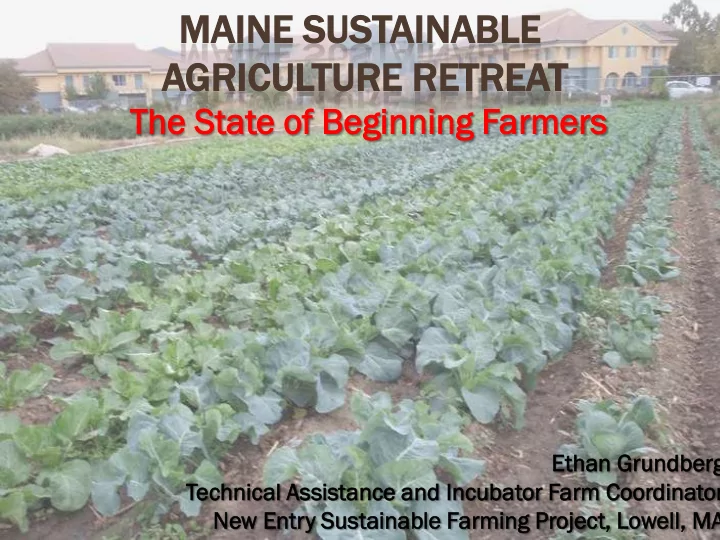

MAINE INE SU SUST STAINAB INABLE LE AGRI RICUL ULTURE URE RE RETRE REAT The e Sta tate e of Be Begi ginni nning ng Farmer ers Ethan han Grundbe berg rg Technic nical al Assist istanc ance e and Incubator or Farm Coordin dinat ator or New Entry y Susta tainable inable Farming ing Proje ject, ct, Lowell, l, MA
WHY FOCUS ON BEGINNING FARMERS? Vilsack’s goal of 100,000 new farmers Average age of US farmers increasing: Estimated that 500,000 farmers will retire 2012-2030 Need to feed a growing global population Unique challenges faced by beginning farmers
WHO ARE BEGINNING FARMERS? “Those who have operated a farm or ranch for 10 years or less either as sole operator or with others who have operated a farm or ranch for 10 years or less.”
WHO ARE BEGINNING FARMERS? Younger, more diverse, and working second jobs
WHO ARE BEGINNING FARMERS? Smaller farms, higher percentage of organic (only captures certified organic) and direct to consumer sales
WHO ARE BEGINNING FARMERS? Lots of animals and specialty crops, fewer grains
WHO ARE BEGINNING FARMERS?
WHO ARE BEGINNING FARMERS? The numbers in Massachusetts Top 10 Beginning ning Farmer er Industri tries es in MA 700 er of Farmers 600 500 Number 400 300 200 100 0
WHAT ARE THE CHALLENGES FOR BEGINNING FARMERS? 1. Most didn’t grow up farming -- must acquire production skills, technical/mechanical skills. business skills, and managerial skills elsewhere
WHAT ARE THE CHALLENGES FOR BEGINNING FARMERS? 2. Lack of access to capital and credit -Hard to save money -Traditional sources of ag credit sometime inappropriate or difficult to obtain
WHAT ARE THE CHALLENGES FOR BEGINNING FARMERS? 3. Lack of access to land U.S. Average Land Values $2,000 $1,800 $1,600 $1,400 $1,200 $1,000 $800 $600 $400 $200 $0 1950 1953 1956 1959 1962 1965 1968 1971 1974 1977 1980 1983 1986 1989 1992 1995 1998 2001 2004
WHAT ARE THE CHALLENGES FOR BEGINNING FARMERS? 4.High costs of student loan debt payment and health care
WHAT ARE THE CHALLENGES FOR BEGINNING FARMERS? 5. Direct to consumer marketing
RESOURCES TO HELP BEGINNING FARMERS SUCCEED Government programs BFRDP Funding Individual Development Accts (2008 Farm Bill) FSA Beginning Farmer Fund Micro-lenders Student Farms Incubator Programs
THE NEW ENTRY MODEL The missio sion n of t f the New Entry y Sustain ainab able le Farm rming g Proj roject ct (New Entry) y) is to assist pe peopl ple with limit ited d re resourc rces es who have an interes rest in smal all-scale scale com ommercia rcial l ag agri ricultur lture, e, to o begin fa farm rming in Massac sachuse usetts. tts. The broa roader r goals s of Ne f New Entry y are re to supp pport t the vitality ity and sustain ainabili ability ty of t f the re region's 's agri ricultu lture re, , to build long term rm economic mic self-rel relian iance ce and food securi rity ty among pa partic icip ipants ants an and their r com ommuniti nities, es, an and to o expa pand ac access ss to o high-qua uali lity, , cultur urally ally app pprop ropri riate e foods in underser erved ed are reas throug rough h pro production tion of l f locall lly-gr grown n foods.
THE NEW ENTRY MODEL Ex Explore lore Far arming! ng!
THE NEW ENTRY MODEL Far arm Business ness Pla lanning ing Cla lass
THE NEW ENTRY MODEL Incuba cubator Far arm Trai aining ing Sites
THE NEW ENTRY MODEL Pr Prac actical tical Field ld Trai ainings ings
THE NEW ENTRY MODEL World ld PEA EAS S Mark arketin ting g Cooperat operativ ive
THE NEW ENTRY MODEL Lan and d Mat atch ching ng Service ice
THE NEW ENTRY MODEL Mi Miscellaneous cellaneous projects: ects: Livest stock ock/MPP /MPPU U an and BF BFAA
REMAINING GAPS IN SERVICE PROVISION Mechanical training Access to appropriate credit sources Access to larger tracts of land Assistance with laws, regulation, and certification Assistance with accounting/record keeping Advanced training curriculum for beginning farmers scaling-up
REMAINING GAPS IN SERVICE PROVISION
QUESTIONS?
PRIMARY REFERENCES 2007 Census of Agriculture: New Farms, New Farm Operators . http://www.agcensus.usda.gov/Publications/2007/Online_Highlights/Fact_Sheets/new_farm s.pdf Ahearn, Mary and Doris Newton. Beginning Farmers and Ranchers . USDA Economic Information Bulletin Number 53, May 2009. http://ers.usda.gov/Publications/EIB53/EIB53.pdf Duffy, Michael. Issues Facing Beginning Farmers and Ranchers. Iowa State Beginning Farmer Center, July 2007. www.apfo.usda.gov/Internet/FSA_File/issues sues.ppt Low, Sarah A. and Stephen Vogel. Local Foods Marketing Channels Encompass a Wide Range of Producers . Amber Waves Magazine, a Publication of the ERS.,December 2011. http://www.ers.usda.gov/AmberWaves/December11/Features/LocalFoodMarketing.htm Shute, Lindsey et al. Building a Future with Farmers: Challenges Faced by Young, American Farmers and a National Strategy to Help Them Succeed. National Young Farmers Coalition, November 2011. http://www.youngfarmers.org/reports/Building_A_Future_With_Farmers.pdf
Recommend
More recommend